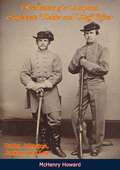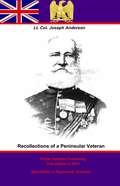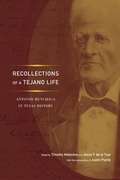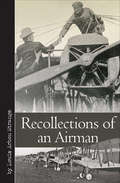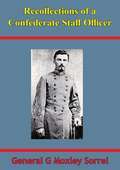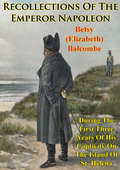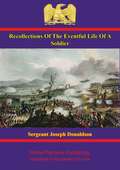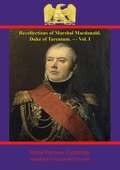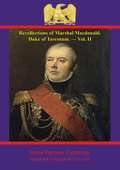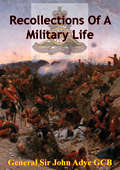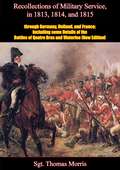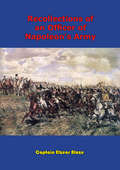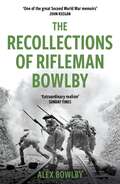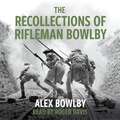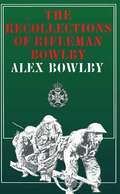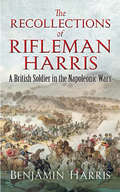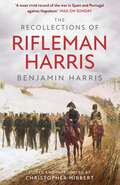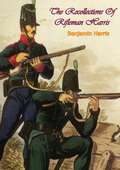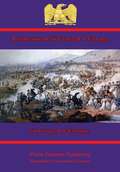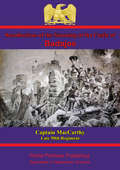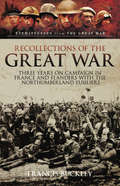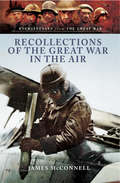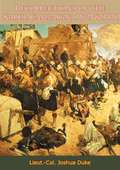- Table View
- List View
Recollections of a Maryland Confederate Soldier and Staff Officer Under Johnston, Jackson and Lee
by McHenry HowardMcHenry Howard was the son of Colonel John Eager Howard of the revolution. His mother was the daughter of Francis Scott Key. At the outbreak of the civil war Mr. Howard was living in Baltimore, making his way to Richmond, he entered the First Maryland regiment, becoming a sergeant in Company H, and served under Joseph E. Johnston until March, 1862. At that time he was appointed aide on the staff of Brigadier General C. S. Winder, with whom he served until the death of the latter at Cedar Run, August 9, 1862. For some months he was acting ordnance officer on the staff of Brigadier General G. H. Steuart, acting sometimes as inspector general and sometimes as adjutant general. In company with Steuart he was captured at Spotsylvania and spent several months in Fort Delaware, whence he was sent to Savannah in November, 1864, for exchange. After this was effected he returned to Richmond; and in January, 1865, he became acting inspector general on the staff of Major General G. W. C. Lee, with whom he retired from Richmond. Captured at Sailor's creek, Lieutenant Howard was sent to the old capitol prison, Washington, where he was on the night of Lincoln's assassination. He was transferred to Johnson's island, in Lake Erie, whence he was released in May, 1865.The book is what it claims to be, “recollections,” and not an attempt at a systematic study of the war...One of its most attractive features is the revelation of the personality of the author, which is found on every page. The reader feels anxious to know him. The personal side of army life is of course stressed on the field, in battle, in camp, and in prison.
Recollections of a Peninsular Veteran
by Pickle Partners Publishing Captain Acland Anderson Lt.-Colonel Joseph Anderson C.B. K.H.This ebook is purpose built and is proof-read and re-type set from the original to provide an outstanding experience of reflowing text for an ebook reader. Lt. Col, Anderson wrote his memoirs as for his own family not suspecting their interest to the larger reading public. As such they hold a charm of their own apart from a number of the more swashbuckling accounts of soldier's adventures in the British army during the Napoleonic and Victorian periods. That is not to say that they are staid in any way but written from a more modest view-point than some. Joining the British army at the tender age of fifteen as an ensign in the 78th Regiment of Foot, he took part on the clash at Maida in which an out-numbered British force decisively defeated the French division of General Reynier. Posted to the main Peninsular theatre of war, he took part on the battles of Talavera, Busaco and Fuentes d'Oñoro. A humane and reasonable man capable of great bravery, such as going into French lines to recover the body of his dead friend, Anderson's memoirs have deserved a greater audience than the circle of his family and were duly published after his death. Text taken, whole and complete, from the 1913 edition published in London by Edward Arnold, Original 330 pages. Author - Lt.-Col Joseph Anderson C.B. K.H. 01/06/1790 - ??/01/1877 Foreword - Captain Acland Anderson ????-????
Recollections of a Tejano Life: Antonio Menchaca in Texas History
by Timothy Matovina Jesús F. de la TejaSan Antonio native, military veteran, merchant, and mayor pro tem José Antonio Menchaca (1800–1879) was one of only a few Tejano leaders to leave behind an extensive manuscript of recollections. Portions of the document were published in 1907, followed by a “corrected” edition in 1937, but the complete work could not be published without painstaking reconstruction. At last available in its entirety, Menchaca’s book of reminiscences captures the social life, people, and events that shaped the history of Texas’s tumultuous transformation during his lifetime. Highlighting not only Menchaca’s acclaimed military service but also his vigorous defense of Tejanos’ rights, dignity, and heritage, Recollections of a Tejano Life charts a remarkable legacy while incorporating scholarly commentary to separate fact from fiction. Revealing how Tejanos perceived themselves and the revolutionary events that defined them, this wonderfully edited volume presents Menchaca’s remembrances of such diverse figures as Antonio López de Santa Anna, Jim Bowie, Davy Crockett, Sam Houston, General Adrián Woll, Comanche chief “Casamiro,” and Texas Ranger Jack Hays. Menchaca and his fellow Tejanos were actively engaged in local struggles as Mexico won her independence from Spain; later many joined the fight to establish the Republic of Texas, only to see it annexed to the United States nine years after the Battle of San Jacinto. This first-person account corrects important misconceptions and brings previously unspoken truths vividly to life.
Recollections of an Airman (Vintage Aviation Library)
by Louis Arbon StrangeThis candid WWI memoir takes readers inside the cockpit with an RAF officer on the Western Front from the outbreak the Great War until its end in 1918.Louis Arbon Strange was at the Royal Air Force’s Central Flying School when war broke out in 1914. He immediately reported to Royal Flying Corps headquarters and joined No.5 Squadron. Strage remained on active duty throughout the war, serving his country over the Western Front from August of that year until the enemy’s surrender.Strange transferred to No.6 Squadron in 1915 and went on to form and command No.23 Squadron. Due to illness, he did not accompany his Squadron to France, but spent that time training others. He took charge of the Machine-Gun School at Hythe and other schools of aerial gunnery before returning to the Front. There he commanded the 23rd Wing, and finally took command of the 80th Wing from June 1918 until the end of the war. As Strange chronicles his experiences, he provides unique insight into how and why the Allied airmen eventually prevailed.
Recollections Of A Confederate Staff Officer [Illustrated Edition]
by General G. Moxley SorrelIncludes Civil War Map and Illustrations Pack - 224 battle plans, campaign maps and detailed analyses of actions spanning the entire period of hostilities."As a young man in Georgia, G. Moxley Sorrel enlisted in a cavalry unit even before the Civil War erupted, so eager was he to serve his home state. During the war, as an aide-de-camp on Brigadier General James Longstreet's staff he fought in many battles, including those at Chickamauga and Chattanooga. He was at Longstreet's side when Longstreet was struck down in 1864. Sorrel's "rough jottings from memory" provide vivid and detailed descriptions of many of the war's chief participants and events. His military career was cut short when he was shot in the lungs at Hatcher's Run. Although he survived, the war ended before he could return to duty. In his declining years he wrote, "For my part, when the time comes to cross the river like the others, I shall be found asking at the gates above, 'Where is the Army of Northern Virginia? For there I make my camp.'"-Paperback Edition
Recollections Of The Emperor Napoleon, During The First Three Years Of His Captivity On The Island Of St. Helena
by Betsy Elizabeth Balcombe"Young Elizabeth Balcombe, or Betsy to friends and family, found life on the remote island of St Helena intolerably dull. Most fourteen-year-olds would. Her father had been posted to that unforgiving station in the Atlantic and, being a family man, he took his family with him. Life was bleak in Balcombe's bungalow on the fringe of James Town. But then, in October 1815, the situation was transformed by the arrival of an unusual visitor. Napoleon Bonaparte, one-time master of Europe, now prisoner and exile, stepped ashore. The Balcombes, like all the islanders, were amazed. And even more so when Napoleon, taking a fancy to their bungalow (the Briars) moved in with them. Betsy, overcoming her surprise at sharing her home with an emperor, delighted in his company and the two became firm friends. Miss Betsy Balcombe made the most of her time with the world's most famous prisoner, keenly observing all around her, noting down conversations, recording moods. The result is a unique set of memoirs which records in astonishing detail an almost unbelievable story. That of how a precocious teenager and an emperor talked, argued, played, confided and teased their way through grim years of exile on the barren rock of St Helena."-Print ed.
Recollections Of The Eventful Life Of A Soldier: By The Late Joseph Donaldson, Sergeant In The Ninety-Fourth Scots Brigade
by Sergeant Joseph DonaldsonDonaldson "was born in Glasgow, where his father was employed by a mercantile house. With some school companions he ran away to sea and made a voyage to the West Indies, which disenchanted him of a sea life, and he returned home and was sent back to school by his father. Early in 1809 he again ran away, and without communicating with his friends enlisted in the old 94th (Scotch, or Scots, brigade). He accompanied the regiment to Jersey, then to Spain, where it took part in the desperate defence of Fort Matagorda during the siege of Cadiz, and afterwards was with Picton's division in the principal battles and sieges in the Peninsula from 1811 to 1814" (Oxford DNB). He "was an intelligent man, and possessed a wider set of interests than was common in the ranks, so that it is always worthwhile to look up his notes and observations. His description of the horrors of Masséna's retreat from Portugal in 1811 is a very striking piece of lurid writing . . . The Eventful Life of a Soldier is well worth reading" (Oman, Wellington's army p. 30).Author -- Sergeant Joseph Donaldson (1793-1830)Text taken, whole and complete, from the edition published in Philadelphia, G. B. Zieber & co., 1845.Original Page Count - vii, and 231 p.Illustrations -- 9 maps and plans.
Recollections of Marshal Macdonald, Duke of Tarentum. — Vol. I (Recollections of Marshal Macdonald, Duke of Tarentum #1)
by Camile Rousset Marshal Etienne-Jacques-Joseph-Alexandre Macdonald, Duc de Tarente Stephen Louis SimeonThe dignity of Marshal of France was to be the apogee of success for any general in Napoleonic France, since the Emperor only created 26 during his years on the throne. Fame, riches and high station in the Imperial Court were the bountiful reward for hard service on the battlefield. Napoleon handed out these dignities, along with kingdoms, principalities, admiralties, dukedoms for more than purposes of recognition; they were also to bind the recipient to his empire even more tightly. Marshal Macdonald was not a man to be flattered or bought; he was of Scottish descent and held his own views. His memoirs bear this imprint of forthright opinion, which had led him into trouble with the Emperor, but such was his value on the battlefield he was courted again by Napoleon.Marshal Macdonald fought all across Europe, particularly at the battle of Jemappes in the Revolutionary armies on the Rhine. He fought well under Napoleon's eagles in Spain, Russia, Germany and France itself. Outstanding at the battle of Wagram, his attack on the Austrian centre, for which he became the only man to be made marshal on the field of battle by Napoleon, clinched the day. Never wholly Napoleon's man, he was a prime mover in forcing his master's abdication in 1814 and refused to rejoin him in 1815.This first volume Marshal Macdonald recounts his life up to and including the battle of Wagram in 1809. Author - Marshal Macdonald, Etienne-Jacques-Joseph-Alexandre, Duc de Tarente, 1765-1840.Editor - Rousset, Camille, 1821-1892.Translator - Simeon, Stephen Louis, 1857-1937Text taken, whole and complete, from the edition published in 1892, London, by Richard Bentley and Son.Original Page Count - 355 pages.
Recollections of Marshal Macdonald, Duke of Tarentum. — Vol. II (Recollections of Marshal Macdonald, Duke of Tarentum #2)
by Camile Rousset Marshal Etienne-Jacques-Joseph-Alexandre Macdonald, Duc de Tarente Stephen Louis SimeonThe dignity of Marshal of France was to be the apogee of success for any general in Napoleonic France, since the Emperor only created 26 during his years on the throne. Fame, riches and high station in the Imperial Court were the bountiful reward for hard service on the battlefield. Napoleon handed out these dignities, along with kingdoms, principalities, admiralties, dukedoms for more than purposes of recognition; they were also to bind the recipient to his empire even more tightly. Marshal Macdonald was not a man to be flattered or bought; he was of Scottish descent and held his own views. His memoirs bear this imprint of forthright opinion, which had led him into trouble with the Emperor, but such was his value on the battlefield he was courted again by Napoleon.Marshal Macdonald fought all across Europe, particularly at the battle of Jemappes in the Revolutionary armies on the Rhine. He fought well under Napoleon's eagles in Spain, Russia, Germany and France itself. Outstanding at the battle of Wagram, his attack on the Austrian centre, for which he became the only man to be made marshal on the field of battle by Napoleon, clinched the day. Never wholly Napoleon's man, he was a prime mover in forcing his master's abdication in 1814 and refused to rejoin him in 1815.This second volume Marshal Macdonald recounts his experiences up to the fall of Napoleon in 1815. Title - Recollections of Marshal Macdonald, Duke of Tarentum. -- Vol. IISeries Name - Recollections of Marshal Macdonald, Duke of Tarentum.Series Number --2Author - Marshal Macdonald, Etienne-Jacques-Joseph-Alexandre, Duc de Tarente, 1765-1840.Editor - Rousset, Camille, 1821-1892.Translator - Simeon, Stephen Louis, 1857-1937Text taken, whole and complete, from the edition published in 1892, London, by Richard Bentley and Son.Original Page Count - 328 pages.
Recollections Of A Military Life [Illustrated Edition]
by General Sir John Adye GCBIncludes 24 maps, plans and illustrationsGeneral Sir John Adye (1819-1900) served his country over a long and victorious career in the Royal artillery. A pillar of the Victorian military establishment, his first taste of action came during the Crimean War (1853-1856) and saw as much as any man could care to in the brutal battles of Alma, Balaklava and Inkermann. He and his men were part of the bombardment of Sevastopol, his diaries are a brutal and frank reminder of the terrible conditions of the troops who fought there. Appointed to the staff in India just before the Indian Mutiny (1857-1858) during which he was involved in the retaking of Cawnpore and testifies to the savagery of the fighting of the entire conflict. His criticisms of the British administration that led to the revolt are very interesting and contrast with the more jingoist tone of other memoirs of the period. His final active service was as chief of staff and second in command to the successful expedition to Egypt (1881-1882) under Sir Garnet Wolseley culminating in the battle of Tel-El-Kebir.A fantastic Victorian war memoir, highly recommended.
Recollections of Military Service in 1813, 1814, and 1815, through Germany, Holland, and France: including some Details of the Battles of Quatre Bras and Waterloo [New Edition]
by Sgt. Thomas MorrisThis account of military service during the Peninsular War penned by the late sergeant of the 2nd Battalion of the 73rd Regiment of Foot, Thomas Morris, who was not even born by the time of the outbreak of the French Revolution in 1789. At the tender age of 16 in 1812 he became a substitute volunteer in the British Army, enticed by the tales of derring-do and the £60 bounty paid to each man. Even at that young age he had a fine eye for detail and anecdote which he took to Belgium to join the forces pressing Napoleon back into France. He served at the battle of Waterloo in which his regiment was heavily engaged in some of the fiercest fighting charged by French Cavalry no less than 11 times during the battle and bombarded by French artillery. It remained in square without breaking. The 2nd/73rd lost 6 officers and 225 men killed and wounded, the second heaviest casualties suffered by a line infantry regiment.
Recollections Of An Officer Of Napoleon’s Army
by Captain Elzéar Blaze E Jules MérasMany memoirs of the Napoleonic period are recounting, more or less interesting dependant on the author, of the events of their service interspersed by anecdotes of interesting events, Elzéar Blaze eschewed that style of reminiscence and left a singular view of his time in the Grande Armée. His memoirs are highly stylised, divided into the 'themes' of military life, and eruditely written by an educated man of the era, who combined wit with an eye for an anecdote. He covers the different aspects of his military career with amusing stories and vivid recollections of the men with which he served, a number of the generals who commanded them, and the enemies that they were fought and were billeted on if they were in occupation; he covers the school of the Vélites, his military training, the marches, camp-life, bivouacs, active campaigning, and the battles fought under Napoleon. Blaze, like his brother, sought out a military life under the eagles of Napoleon, he enlisting in the Vélites of the Imperial Guard, his brother into the medical services of the army. The Vélites were founded as part of Napoleon's further, ultimately unsuccessful, attempts to sway the aristocracy to fall in line and support his rule. The military tutelage in the Vélites was to be supported by private means, which translated into their ranks being filled with the scions of the nobility and wealthy bourgeoisie. Blaze fought as part of Napoleon's invincibles from 1807 until the end of the empire, but continued his service under the returned Bourbons and retired as captain in 1828.An interesting and different view of the Grande Armée.
The Recollections Of Rifleman Bowlby (W&N Military)
by Alex Bowlby'One of the great Second World War memoirs ... will be read as long as that war is remembered' John Keegan'Extraordinary realism' SUNDAY TIMES'A touch of the Somme and more than a hint of Wilfred Owen' TLSA classic of WWII, this is the vivid memoir of Private Bowlby, who came through the North Africa campaign only to have to battle in bitter fighting against a stubborn and skilled German defence in Italy. It is a truly authentic account of what it was like to fight your way through one of the most gruelling and dangerous campaigns of the Second World War, where so often the hunters became the hunted.A superb first-hand account of the the second world war.
The Recollections Of Rifleman Bowlby (W&N Military)
by Alex Bowlby'One of the great Second World War memoirs ... will be read as long as that war is remembered' John Keegan'Extraordinary realism' SUNDAY TIMES'A touch of the Somme and more than a hint of Wilfred Owen' TLSA classic of WWII, this is the vivid memoir of Private Bowlby, who came through the North Africa campaign only to have to battle in bitter fighting against a stubborn and skilled German defence in Italy. It is a truly authentic account of what it was like to fight your way through one of the most gruelling and dangerous campaigns of the Second World War, where so often the hunters became the hunted.A superb first-hand account of the the second world war.
The Recollections Of Rifleman Bowlby (W&N Military)
by Alex Bowlby'One of the great Second World War memoirs ... will be read as long as that war is remembered' John Keegan'Extraordinary realism' SUNDAY TIMES'A touch of the Somme and more than a hint of Wilfred Owen' TLSA classic of WWII, this is the vivid memoir of Private Bowlby, who came through the North Africa campaign only to have to battle in bitter fighting against a stubborn and skilled German defence in Italy. It is a truly authentic account of what it was like to fight your way through one of the most gruelling and dangerous campaigns of the Second World War, where so often the hunters became the hunted.A superb first-hand account of the the second world war.
The Recollections of Rifleman Bowlby (Cassell Military Paperbacks Ser.)
by Alex BowlbyThe classic memoir by an infantryman in the British army during the Second World War, &“a book to bring a shiver to the most grizzled veteran (The Sunday Times). In 1944, having distinguished itself in the North Africa campaign, Rifleman Bowlby&’s battalion of Greenjackets was sent to Italy. But instead of being used in the specialized role for which it had been trained, most of the battalion&’s vehicles were taken away on arrival, and the riflemen were told that they were to be used as ordinary infantry. Stripped of its hard core of regulars, the battalion suffered one disastrous defeat after another until its hard-won reputation fell in tatters. This is a memoir that captures &“quite extraordinary realism in this worm&’s eye view . . . the sweating, slogging, frightened infantryman in conditions of extreme stress and horror&” (The Sunday Times).
The Recollections of Rifleman Harris: A British Soldier in the Napoleonic Wars (Dover Military History, Weapons, Armor)
by Benjamin HarrisDiaries, memoirs, and letters by officers of the Napoleonic era abound, but there are few reminiscences by common foot soldiers. This extraordinarily vivid and entirely authentic report by British rifleman Benjamin Harris offers rare glimpses of life among the enlisted men. Harris's personal anecdotes, brimming with ready wit and memorable descriptions, tell of military life from the bottom up: the soldiers' camaraderie amid physical hardships and inadequate supplies and equipment, their endemic drunkenness and frequent hunger, the terrible punishments meted out for even small infractions, and the narrow margin between death and survival.In the mid-1830s, Harris was working as a London cobbler when he met a former British Army officer who asked him to recount his wartime experiences. A natural storyteller with a remarkable tale to tell, Harris recalled his years of active service, which began in 1803 when he joined the 95th Regiment of Foot in Ireland and were followed by campaigns from 1808 to 1809 in Portugal and Spain. First published in 1848, this memoir was neither popular nor well received during Harris's lifetime, but since its rediscovery in the early twentieth century, it has become one of the most valuable documents of the Peninsular War.
The Recollections of Rifleman Harris (MILITARY MEMOIRS)
by Benjamin Randell Harris'Describing narrow squeaks and terrible deprivations, Harris's unflowery account of fortitude and resilience in Spain still bristles with a freshness and an invigorating spikiness' SCOTLAND ON SUNDAY'A most vivid record of the war in Spain and Portugal against Napoleon' MAIL ON SUNDAYBenjamin Harris was a young shepherd from Dorset who joined the army in 1802 and later joined the dashing 95th Rifles. His battalion was ordered to Portugal, where he marched under the burning sun, weighed down by his kit and great-coat, plus all the tools and leather he had to carry as the battalion's cobbler - 'the lapstone I took the liberty of flinging to the Devil'. Rifleman Harris was a natural story-teller with a remarkable tale to unfold, and his Recollections have become one of the most popular military books of all time.
The Recollections of Rifleman Harris (MILITARY MEMOIRS)
by Benjamin Randell Harris'Describing narrow squeaks and terrible deprivations, Harris's unflowery account of fortitude and resilience in Spain still bristles with a freshness and an invigorating spikiness' SCOTLAND ON SUNDAY'A most vivid record of the war in Spain and Portugal against Napoleon' MAIL ON SUNDAYBenjamin Harris was a young shepherd from Dorset who joined the army in 1802 and later joined the dashing 95th Rifles. His battalion was ordered to Portugal, where he marched under the burning sun, weighed down by his kit and great-coat, plus all the tools and leather he had to carry as the battalion's cobbler - 'the lapstone I took the liberty of flinging to the Devil'. Rifleman Harris was a natural story-teller with a remarkable tale to unfold, and his Recollections have become one of the most popular military books of all time.
The Recollections Of Rifleman Harris
by Pickle Partners Publishing Captain Henry Curling Benjamin Randell HarrisThis ebook is purpose built and is proof-read and re-type set from the original to provide an outstanding experience of reflowing text for an ebook reader. In an era devoid of modern communication methods, letters and diaries from the literate officer classes of the Napoleonic wars abound ,in all of the languages of the combatant nations. Much less often heard is the voice of the enlisted man, particularly in the British armed forces, an invaluable insight is provided by the recollections of Rifleman Harris late of the 95th Rifles. The often brutal realities of the era were collated by an officer whom he knew, Captain Curling, and published in 1848, and although not well known at the time has become one of the most famous recorded by any rank. One of Harris' first memoires of his time in the army is the devastating spectacle of a firing squad for a court-martial of one of the rank and file and of the court-martial of the bungling General Whitelock whose mishandled expedition to Buenos Ayres. The man from the rank and file was shot, but General Whitelock was merely cashiered, a difference of class and the times unintentionally brought to light. Whitelock's court-martial provides the first appearance of General (at the time Colonel) Craufurd, who went on the expedition with Whitelock and want to have his former commander shot for his ineptitude!, and under whom Harris would spend a great deal of his soldiering career. Harris takes a small part in another expedition to Denmark, but the only sort of action he is involved in is defending a Danish family from the depredations of fellow soldiers. It is however with his entrance into Portugal in 1808, that his adventures really begin to take shape; as his fellow soldiers fall around him at the battles of Roliça and Vimiero he describes the horrific injuries sustained, the plundering of the dead that took place (which he was not above joining in) and the task of the surgeons to try and stitch up the wounded. A large part of the narrative is taken by the retreat of Sir John Moore's army to Coruña, and the Light Brigade's to Vigo. His tales of the retreat are vividly described; from the capture of the French general Lefebvre-Desnouettes at Benavente, the privation, the wifes of the soldiers and their struggle to stay with the column, to the iron resolve of General Craufurd to keep going. Eventually and in a pitiable state Harris reaches Vigo and embarks for England. It was not enemy action that ended Harris' career in the army but diseases contracted during the pestilent 1809 Walcheren campaign, the lingering sickness forced Harris to leave the army and take up trade as a cobbler. A valuable and excellent read. Text taken, whole and complete, from the 1848 edition, published in London by H Hurst. Original - 298 pages. Author- Benjamin Harris (1781-????) Editor - Captain Henry Curling (????-????) Linked TOC.
Recollections of Sir George B. L’Estrange
by Sir George B. L’estrangeThis ebook is purpose built and is proof-read and re-type set from the original to provide an outstanding experience of reflowing text for an ebook reader. Sir George L'Estrange was only an ensign when he started on his Peninsular career in the 31st or Huntingdonshire Regiment of Foot, joining the war in 1812. Arriving in Portugal and meeting with his cousin, who had escaped from French capture at Verdun, Sir George recounts his cousin's story before returning to his own narrative and his first major engagement at the battle of Vittoria in 1813. His experiences of the fighting after Vittoria until the end of the war make up the majority of the book: encompassing snow-bound bivouacs in the Pyrenees; hard fighting at Orthez; and his trials at the forefront of the fighting. The finale details various anecdotes that he must have heard from brother officers whilst on duty in Spain and Portugal. A solid memoir with much to recommend it to the reader. Title - Recollections of Sir George B. L'Estrange Sub-Title - Late of the 31st Regiment, and Afterwards of the Scots Fusilier Guards Author -- Sir George B. L'Estrange (1796-1878) Text taken, whole and complete, from the edition published in 1874, London, by Marston, Low, & Searle. Original - viii and 280 pages. Illustrations - one portrait and 8 illustrations.
Recollections Of The Storming Of The Castle Of Badajos
by Captain James MaccarthyThe situation for the Duke of Wellington and his British and Portuguese troops in 1812 was somewhat perilous. Although they had chased Masséna and his French Legions from Spain, overwhelming numbers of enemy troops were still in Spain despite being scattered through the provinces. For Wellington to move forward and take the fight to the enemy, he would have to take the two border fortresses of Ciudad Rodrigo and Badajos, and do so quickly before the bickering French marshals united against him. After capturing Ciudad Rodrigo in a bloody but short siege, the Iron Duke turned his attention on the much more formidable fortress of Badajos, a fortress that they had failed to take before.The few trained Allied engineers were bolstered by volunteer officers like the author Captain MacCarthy, who undertook the dangerous work of the engineers. However, a lack of artillery and shot meant that the task would be exceptionally difficult, and pressed by time Wellington orders an early assault by the best of his infantry over barely practicable breeches. As a diversion, he also orders an attempt to capture the castle of Badajos by escalade - the author himself being part of this diversionary effort. In the event, the breeches prove to be impregnable and after repeated murderous attempts, the defences of Badajos are only breached by the ladder borne assault on the castle.Captain MacCarthy's short narrative is vividly written filled with the blood and shot of the siege and the castle's final capture.
Recollections of the Great War: Three Years on Campaign in France and Flanders with the Northumberland Fusiliers
by Francis BuckleyThis rare primary source account is the story of the hard fighting battalion of the 7th Northumberland Fusiliers, which saw action on the Somme, Passchendaele and in the Battle of Arras. This wonderfully detailed account provides a rare insight into the experiences of the common soldier on the front line during some of the bitterest conflicts of the war.Unembellished and unwavering in his account, Francis Buckley here records not only the events of the battles he fought in, but also provides an emotional tribute to the heroism of the friends he made and lost during his time in the field. As well as his fellow troops of the 7th Northumberland Fusiliers, Buckley also remembers, with great fondness, the bravery of the officers and men of the 149th Infantry Brigade, and of the 50th Division. His recollections here provide a poignant reminder of the true human cost of war in the modern age.
Recollections of the Great War in the Air: Recollections Of The Great War In The Air (Eyewitnesses from The Great War)
by James McConnell&“The memoir of . . . an American pilot flying with the famous French Flying Corps&’ American Layfayette Escadrille and provides a unique personal insight.&”—Firetrench In 1915 James Roger McConnell enlisted as a US volunteer in the French Flying Corps. He was part of a remarkable band of American volunteers which were formed into the famous Lafayette Escadrille, which was then based at Verdun. This book brings his personal account of the war, Flying for France, to a new generation of readers. His memoirs produce an amazing insight into the early aerial battles and trace the evolution of aerial warfare as the rickety aircraft of 1915 rapidly evolved into the purpose-built fighters of 1917. Casualties among the American Escadrille were very high and McConnell&’s own luck finally ran out when he was ambushed by two German fighters and was killed in action in March 1917. His gripping and detailed memoir of the war is his lasting memorial; his honest account of the everyday life of a pilot in the Great War is matched only by Sagittarius Rising. However, his dramatic description of the battlefield of Verdun viewed from above is one of the classic descriptions of any wartime memoir and is unmatched by any other Great War writer. &“Resurrects an important part of the first-person literature of the Lafayette Escadrille. A long-lost gem.&”—Over the Front &“The memoir and letters give a surprising amount of detail about the pilot&’s life and tactics employed. McConnell&’s story is certainly an interesting one and this is a short and easily digestible introduction to the life of a First World War pilot.&”—WW1 Geek
Recollections of the Kabul Campaign, 1879 & 1880
by Lieut.-Col. Joshua DukeRecollections of the Kabul Campaign, 1879 & 1880 is a firsthand account of the Second Anglo-Afghan War (1878-80). The author, Joshua Duke, was a British officer in the Bengal Medical Service, attached to “our native army in India.” The war began in Nov. 1878 when Great Britain, fearful of what it saw as growing Russian influence in Afghanistan, invaded the country from British India.The first phase of the conflict ended in May 1879 with the Treaty of Gandamak, which permitted the Afghans to maintain internal sovereignty but forced them to cede control over their foreign policy to the British. Fighting resumed in Sept. 1879 after an anti-British uprising in Kabul that resulted in the death of Sir Louis Cavagnari, the British resident in Kabul and a negotiator of the Treaty of Gandamak, and of nearly all the British soldiers at the residency. The Kabul Field Force, commanded by General Sir Frederick Roberts and composed of British and Indian army regiments, was sent to Kabul to restore order and take revenge.This book offers a vivid eye-witness account of the main incidents of the war, including the bloody siege of the Sherpur Cantonment of Dec. 1879, in which Afghan forces mounted a nearly successful attack on the Anglo-Indian forces, the relief march from Kabul to Kandahar in Aug. 1880, and the climactic Battle of Kandahar in Sept. 1880 that ended the war.In addition to his account of the military operations, Duke provides insights from his perspective as a medical officer, for example, on the treatment of wounds by traditional methods by the Afghan forces.The book is illustrated with a frontispiece photograph of Roberts and maps and drawings of important battles and fortresses. The appendix contains a summary explanation of the causes of both Anglo-Afghan wars, the full text of the Treaty of Gandamak, and copies of correspondence between Russian and Afghan authorities that were found by the British when they occupied Kabul.
